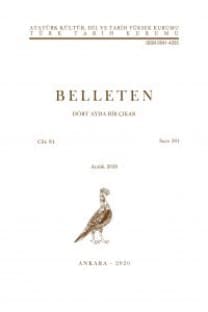MATERIALIA TURCICA No. I. 1975 Bochum Ruhr Üniversitesi Türkoloji öğrencilerine yardımcı araştırmalar dergisi (Almanca) 73 sahife. (Yazışma adresi: Dr. HERMANN VARY, Akad. Oberrat Lector für Türksprachen. Bochum, Ruhr-Universitt Sprachwissenschaftl. Institut). F. Almanya. [Kitap Tanıtımı]
Her altı ayda (sömestrde) çıkacak olan bu değerli dergi bizi özellikle iki bakımdan ilgilendirir:
1- Ruhr Üniversitesi Türkoloji bölümü öğrencileri, seçtikleri bilim dalında ucuz (belki de meccani) kılavuz kitaba sahip olurlar. Bu kılavuzdaki bibliyografya sayesinde müracaat edecekleri kitap ve dergileri tanırlar. Üniversitenin zengin kütüphanesinde kaynaklar hazırdır. Koridorlarda duran çoğaltma makinalarında istedikleri sahife veya bölümün kopyasını elde edebilirler. Masraf özel kağıt ücretinden ibarettir.
Sömestrler yekdiğerini takip ettikçe, öğrenciler özel ihtisas kitaplığına sahip olurlar.
2- Derginin içindeki incelemeler Türkiye'ye ve Türk dünyasına inhisar ettiği için bizi çok yakından ilgilendirir. Türkoloji bölümü öğrencisi dar bir konuya saplanıp kalmadan Türk dünyasının dili, tarihi, coğrafyası ve günün soruları ile tanışarak geniş görüş ufkuna sahip olur.
Anahtar Kelimeler:
Materialia Turcica, Ruhr Üniversitesi, Türkoloji, Türkçe, Özbekistan, Yugoslavya'daki Türkler
The Evolution of Iran as a National State
The Persian Empire, the foundation of which by Cyrus the Great we are now celebrating, was dissolved as the result of the Greek invasion under Alexander; it was restored, some five and a half centuries later, by the native dynasty of the Sassanians, who like the Achaemenids before them, had their origins in the south-western province of Fars or Pars, which has given Iran the name by which it is known in the West. The Persian Empire thus restored disputed with the heirs of Alexander, the rulers of Rome and Byzantium, for the possession of Western Asia. The later phase of this struggle is referred to in the Koran: "The Greeks have been defeated in a land hard by: but after their defeat they shall defeat their foes." This is a reference to the war waged against the Byzantines by the Sassanian Emperor Khusrau Parviz, who in the course of a war of more than twenty years' duration, was to extend the boundaries of the Persian Empire to where they had lain in the days of Darius, on the shores of the Mediterranean and the Aegean; it is also a prophecy of the Byzantines' ultimate victory with the triumphal entry of Heraclius into Jerusalem in 629.
Keywords:
Evolution of Iran, Persian Empire, Alexander, Byzantine, Egypt,
- ISSN: 0041-4255
- Yayın Aralığı: Yılda 3 Sayı
- Başlangıç: 1937
- Yayıncı: Türk Tarih Kurumu
Sayıdaki Diğer Makaleler
An Ancient Harbour in the District of Alanya
Alanya Yöresinde Antik bir Liman
İran'ın Milli Bir Devlet Olarak Gelişmesi
Uluslararası Akademiler Birliğinin Münih Toplantısı
Ölümünün Birinci Yıldönümünde Orgeneral Fahrettin Altay'ı anıyoruz
Eski Bir Yazmadaki Meddah Hikayeleri
Sancağa Çıkarılan Osmanlı Şehzadeleri
